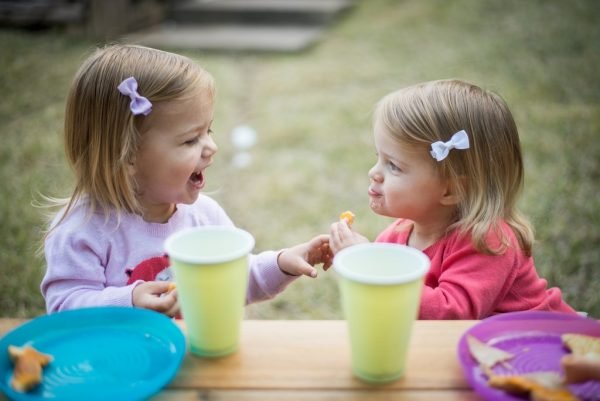Sensitive Periods and the Absorbent Mind
Have you ever heard the phrase, “this child is like a sponge” or something similar? If you have ever experienced close contact with a child from birth until the age of 6 you can see an amazing transformation. Babies born to human, unlike other animals, are quite helpless for the first few years of life. A newborn cannot control their movements, cannot crawl, sit, walk. They have no teeth and rely completely on the adult for nourishment. They cannot communicate except through making uncomfortable loud crying sounds to attract attention, then the adult must try to interpret their needs. They sleep a lot. They are totally dependent.
In the first about 1 year of life they undergo a transformation, they gain motor skills, even begin to move by crawling and walking. They can sit. They can begin to use their hands to feed themselves and explore their environment. They absorb information around them and begin to communicate though signs and words. By the time they reach the age of 3 they are quite proficient and many tasks such as feeding themselves, walking, talking. The are able to absorb culture and language from the world around them.
Maria Montessori calls the mind of the child from the time between birth and the age of six the Absorbent Mind. The child during this period absorbs much from the environment they live in. It is a period of the most intense growth of the human person. During this time Montessori observed particular areas that the child is drawn to focus their growth in, she calls these areas sensitive periods of growth. During this time period the child is more easily able to absorb knowledge and skills than at any later time in these particular areas. Later, when this time has passed, the knowledge can still be acquired but the effort and time is far greater than during the time when they are particularly sensitive.
The Sensitive Periods for a child from the age of 0-6
To identify a sensitive period, Montessori observed that the child showed intense concentration and interest in a particular activity. They tended to repeat the activity over and over again without tiring. They seemed to get great joy out of this activity. They seem driven to this task and want to continue at it as if seeking mastery or making some unseen link in their mind. They can focus on this for a long period of time. If you notice this in a child, it is recommended to just observe without intervening or interrupting. Allow them the time and space as they construct themselves and learn the skill. Don’t take over and “show” them how to do it properly, unless they ask.
Some particular areas that Montessori observed during this age range were:
ORDER
This is primarily a need to understand how things relate to other things. The child needs predictable places for items, steps for tasks, routines. You may notice a child reacting negatively when their routine is disrupted, or when an item is not where “it should be”. They need to know the same things are going to be there when they come back.

SENSORY PERCEPTION
Through the use of the senses, the child absorbs information about the environment around them. You will often observe a young child placing items in their mouth. Children are also often observed as touching everything. In this way they are making sense of each item. How does it feel, taste, what is it weight? This is a great opportunity for the adult to interact with the child, giving words to describe the sense. This is a ball, this is a cup, this is cold etc. Though the senses come language. Montessori says to never give more to the eye and the ear than we give to the hand.

LANGUAGE
Language does so much to develop the brain of the young child. In the first year a perceptual map of spoken sounds is established in the brain. Montessori noted that the young child just by living absorbs the entirety of his mother tongue or as many languages as are put in the child’s environment. Not only is a child able to duplicate language but also, the language develops who the child is.

MOVEMENT
After about a year the child is able to be independent, they no longer need to be carried around. You will also notice they want to climb in or out of cots, strollers etc by themselves. Montessori recommends allowing them the space to gain skills in this area. Take them for walks where they can walk (you may need to slow your pace to theirs). Instead of removing or locking up items, show them how to interact safely within the environment. This may require some changes to the environment and to the adult’s expectations. Parents are stewards to the life of this person finding out who they are along with the child. Instead of finding the child difficult to inconvenient to our life, we need to embrace the gift they bring to change us.

TINY OBJECTS
Children during this
period have an intese interest in minute objects, from crumbs on the floor, to
tiny insects in the garden, beads on a necklace, small threads etc. Everything
is wonderful and new for them. These tiny objects create an opportunity to
develop fine motor skills and the pincer grasp. Allow the child to explore
small things, ensuring that they are safe to handle. If they are still putting
items in their mouth, close supervision may be required. They seem to be asking
“what does this do and what can I do with it?”.

SOCIAL GRACES
In this period, the child is trying to understand the relationship between people and themselves. What behaviour is acceptable, what do I want. You may hear the child say “mine” or “me” a lot. This is a time when the development of manners and how behaviour affects others begins. Over time and with guidance, the child begins to see the needs of others and are more willing to share with and comfort others. They will look to adults as models for behaviours. Adults must admit when they are wrong and explain why so that children learn why they in turn are asked to acknowledge mistakes (for example). IN reading with your children, you will also have opportunities to discuss feelings and personal interactions of the characters to help children develop appropriate social skills. Remember that behaviour is not good or bad in essence but a way to communicate. Try to peacefully interact with the child and help them to communicate in ways that are easier on them and others socially.

You may find some more information about the absorbent mind and sensitive periods from
Maria Montessori’s book “The Absorbent Mind”
And from websites such as: